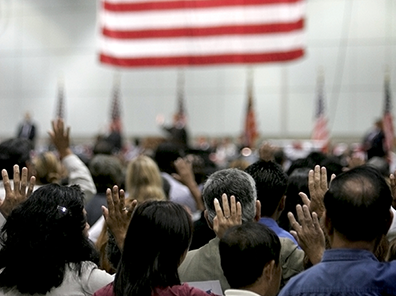
The Congress of the United States, late last month, passed a legalization program which will provide permanent legal status to a specific class of migrants, but those aliens will never become citizens and never will be able to vote. Nor will they be able to create chain migration.
Why has there been nothing in the press about this?
There's a good reason.
To be more specific, the Congress did that but only for some aliens (largely from the Philippines and China) who have lived in the Commonwealth of the Northern Mariana Islands since 2009, and their legal status is only in the CNMI, they cannot use it to move to other parts of the United States, or to become either permanent resident aliens or citizens. Most arrived legally as guest workers.
CNMI, a U.S. jurisdiction under different arrangements since the end of WWII, lies north of Guam in the Western Pacific; the major island is Saipan, and it used to be the site of horrific garment sweatshops.
President Trump signed this legislation, Public Law 116-24, on June 25.
This new arrangement has some positive aspects for these aliens: they will no longer have to obtain and renew residence permits, and their status in the islands no longer relates to being in the good graces of their employers.
More importantly, it has major positive overtones for the CNMI Establishment; the workers will remain (CNMI depends on them) and their wages will be low; and even more significant for the indigenous population, the Chamorros, the comparatively huge guest worker population will never vote, but their U.S. born children, who are citizens, will. But that impact will come later.
The territory’s voteless delegate, Ron Sablan (D-CNMI) carried the legislation, which was endorsed by the current Republican governor, Ralph Torres, and by the islands' Chamber of Commerce. An earlier attempt by Sablan to pass this modest reform had been blocked by an earlier GOP governor of the islands, Benigno Fitial, who persuaded Republicans in the
U.S. House to vote against it.
Fitial, a one-time ally of notorious sweatshops lobbyist Jack Abramoff, was subsequently impeached by the lower house of the CNMI legislature, and resigned rather than face a trial in the CNMI Senate. He was the 13th Governor in American history to be impeached.
The numbers involved are tiny by Mainland standards, but significant in the Marianas, which had an estimated population of 55,154 in 2017. The Department of Homeland Security estimates that some 1,039 aliens will benefit from the bill. They will be drawn from a larger population of non-immigrants, those with CW-1 visas, a group of foreign workers who are only entitled to work in CNMI.
In the last year for which we have complete data, 2017, 13,548 CW-1 visas were issued. There are also much smaller numbers of non-immigrants in the islands who work under the H-1B and H-2A programs.
Because of current and past guest worker programs, the percentage of foreign born in these islands, 45 percent, is more than three times the percentage of foreign born on the Mainland, which is about 14 percent.
Ironies. The House Democrats, who would not think of considering an amnesty this narrow for Mainland aliens, were among those who blithely passed the bill on a voice vote on June 3 of this year.
Ronald Reagan, when faced with a somewhat similar situation in the U.S. Virgin Islands, signed Public Law 97-271 on September 30, 1982. It dealt with ten times as many aliens, and gave them all full green card status; those granted this status could use it anywhere in the States.
I was paying attention at the time, having secured a small Ford Foundation grant to examine that amnesty; it was a pleasant assignment.
